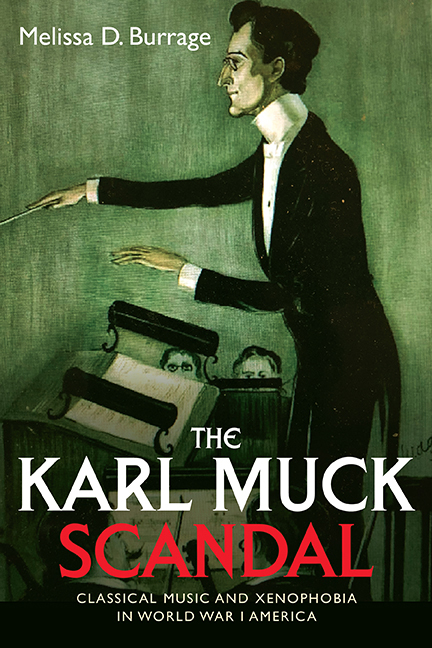Book contents
- Frontmatter
- Dedication
- Contents
- Introduction
- 1 Here on Foreign Shores: Dr. Karl Muck's Acclaim in Boston (1906–1918)
- 2 Mobilization: A Changing Environment for Boston (1917)
- 3 Selling the War: Demonizing the Enemy (1918)
- 4 “Looking for the Trump Card”: Mrs. William Jay's Attacks on Karl Muck in Wartime America (1915–1918)
- 5 “A Leaf in the Storm”: Muck, Higginson, and the Boston Symphony Orchestra (1918–1919)
- 6 Muck's Arrest: “Finding ‘One Weak Spot’” (1918–1919)
- 7 “Only Too Proud to Shoulder It All”: The Sexual Climate of Wartime Boston and Muck's Fall from Grace (1918–1919)
- 8 Muck's Final Years: His Association with the Wagners and Adolf Hitler (1920–1940)
- Coda (1919 to Present)
- Acknowledgments
- Notes
- Bibliography
- Index
- Eastman Studies in Music
8 - Muck's Final Years: His Association with the Wagners and Adolf Hitler (1920–1940)
Published online by Cambridge University Press: 06 September 2019
- Frontmatter
- Dedication
- Contents
- Introduction
- 1 Here on Foreign Shores: Dr. Karl Muck's Acclaim in Boston (1906–1918)
- 2 Mobilization: A Changing Environment for Boston (1917)
- 3 Selling the War: Demonizing the Enemy (1918)
- 4 “Looking for the Trump Card”: Mrs. William Jay's Attacks on Karl Muck in Wartime America (1915–1918)
- 5 “A Leaf in the Storm”: Muck, Higginson, and the Boston Symphony Orchestra (1918–1919)
- 6 Muck's Arrest: “Finding ‘One Weak Spot’” (1918–1919)
- 7 “Only Too Proud to Shoulder It All”: The Sexual Climate of Wartime Boston and Muck's Fall from Grace (1918–1919)
- 8 Muck's Final Years: His Association with the Wagners and Adolf Hitler (1920–1940)
- Coda (1919 to Present)
- Acknowledgments
- Notes
- Bibliography
- Index
- Eastman Studies in Music
Summary
Muck's troubles were far from over when he and his wife Anita returned to Europe in September of 1919. The US federal government had expelled the couple with little regard for their well-being or their privacy. Utterly destroyed by America, a country they once called home, Karl and Anita attempted to reacclimate themselves to a world they had left behind many years before. Muck was initially unable to find stable employment as a musician in the post–World War I economy. He no longer had any savings to speak of, and he had no property. His close political connections to the kaiser did not help matters. In 1918, Wilhelm had abdicated the throne and was exiled to the Netherlands. As New York Times music critic Olin Downes pointed out, “Muck was no hero welcomed home.” The only work he could find was as an itinerant conductor, traveling from city to city, living in hotel after hotel. The transitory quality of their lives was difficult for the couple to bear. Muck worked as a guest conductor at the Berlin State Opera and the Munich Opera Festival, among other places, but these assignments, while prestigious, offered no long-term financial security. Economic instability was only part of the trouble Karl Muck would face, however.
BOI Fails to Maintain the Plea Bargain: The Sealed Muck-Young Letters Are Released to the Press
Just two and a half months after Muck's deportation, another series of events would prove that his troubles were far from over. On November 9, 1919, the Boston Post ran a twelve-part series exposing the real reason for Karl Muck's internment, publishing the very private (and supposedly sealed) letters of Karl and Rosamond. The sensational series was sent by the Associated Press across the United States and Europe, causing Karl, Anita, and Rosamond enormous suffering.
As mentioned in the previous chapter, Muck had accepted a plea bargain and agreed to internment as a “dangerous enemy alien” in exchange for secrecy regarding his affair with Rosamond. He had been assured that if he served his time at Fort Oglethorpe, the US government would not divulge the couple's love letters. Bureau of Investigation division superintendent George E. Kelleher and assistant superintendent Norman L. Gifford had ostensibly committed themselves to permanently sealing Muck's private correspondence in exchange for internment.
- Type
- Chapter
- Information
- The Karl Muck ScandalClassical Music and Xenophobia in World War I America, pp. 279 - 307Publisher: Boydell & BrewerPrint publication year: 2019



